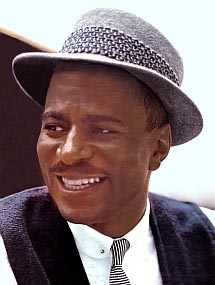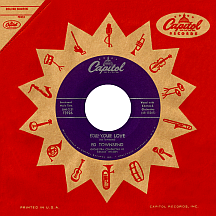ED TOWNSEND
For Your Love
Not everyone who's pursued a show business career has a "backup plan" (that other line of work a person is willing to settle for when hopes and dreams are ultimately dashed). For some it's do or die, all eggs in one basket. Such was Ed Townsend's case, though you could say there were two tiers to his plan: writing songs while striving for center-stage stardom, confident in his ability but willing to sacrifice the greater goal should the odds go against him. While achieving success composing songs, he also became a popular singer...if only briefly.
Townsend's family moved from his birthplace of Fayetteville, Tennessee, straight west a couple hundred miles to music mecca Memphis. His father was a Methodist minister and despite the heavy influence of gospel, blues and folk music during his 1930s childhood, Ed studied law at Arkansas State College. Starting his music career a few years later, it helped to be well-versed in the law; he couldn't be tricked into signing an unethical contract. While serving in Korea with the Marine Corps in the early '50s he had opportunities to perform, which led to a spot with Horce Heidt's band on a tour of eastern Asia. Then he moved to Los Angeles and recorded "Give Me One Chance," a yearning, self-penned R&B plea released on Aladdin near the end of 1956; another original, "Love Never Dies," followed a few months later but neither connected despite solid arrangements and strong vocals. After coming up empty with the summer '57 Dot single "My Need For You," Ed began pounding the L.A. pavement.
One day in early '58, he stopped by the Capitol Records tower near Hollywood and Vine with a ballad he felt was tailor-made for Nat "King" Cole, "For Your Love" (with lyrics like '...oh, I would do anything' and '...I would go anywhere for your kiss,' it certainly approached the Cole standard). After hearing the demo he'd made, Joseph Zerga (a record producer who wrote songs under the name Edmund Paul), impressed with his vocal sound (along the lines of Cole with perhaps a touch of Eckstine or Hibbler), suggested he record the song himself. A contract with the label was signed and within a few weeks it had broken in New York, going as high as number two on top 40 powerhouse WMCA; a top ten hit in dozens of cities across the U.S., the single spent more than two months in the Billboard and Cash Box top 20 charts from April through June 1958.

His original follow-up, "What Shall I Do?," struggled out of the gate, as did an earlier recording on the Carlton label, "A Wo-man's In-tu-it-ion." Over the next year, Townsend had the luxury of working with some of Capitol's best producers and arrangers (including Nelson Riddle, who arranged his album Glad to Be Here). His take on the mid-'30s standard "When I Grow Too Old to Dream" by Sigmund Romberg and Oscar Hammerstein II (a dynamic big band arrangement of what was typically performed as a ballad) peaked mid-chart in the fall of '58. Successive releases struggled and he left Capitol at the two-year mark in early 1960. Moving to Warner Bros., he had slightly better luck with "Stay With Me (A Little While Longer)," a more youthful arrangement by Rene Hall with a backing chorus (male and female singers) identified as The Townsmen. The New York stations passed on it, but the single received a fair amount of airplay in Chicago and several west coast cities. A side note: the B side of his only other Warner 45 was "Cherrigale" ('the only girl I'll ever love...'), an uncommon name that happened to be the same as his soon-to-be second wife.
Moving to the Challenge label, he only released songs he'd written himself, arranging them as well; "Ed Townsend's Boogie Woogie" was credited to The Ed Townsend Orchestra. "And Then Came Love," taking listeners from God's creation ('...day...night...the sun, the moon, the stars...') to the emotional thrill of the title, was a sizeable hit in Southern California, but nowhere else. "Tell Her," written by Bert Burns, was first recorded in the spring of '62 by Gil Hamilton (who would shortly be much better-known as Johnny Thunder), then a few months later by Townsend for Liberty Records, but it was The Exciters' girl-group-with-one-guy version that scored in early '63.
Ed headed to New York City that year to take a position as musical director with Florence Greenberg's Scepter Records, complementing Luther Dixon's A&R duties. Besides working with several of the label's acts, he composed music for other singers, scoring hits with "How Can I Forget" (cowritten with Bernard Solomon and Murray Cohen, it went top ten R&B for Jimmy Holiday, besting a concurrent version by Ben E. King), "The Love of My Man" (big at pop and R&B for Theola Kilgore) and Scepter-Wand's Shirelles, Chuck Jackson, Maxine Brown and Tommy Hunt (the latter's "I Am a Witness" making it to the R&B top ten). Ed's "backup" plan-within-a-plan was working.
From 1964 to 1970 he continued writing songs for others (Clyde McPhatter, Brook Benton, Dee Dee Warwick), gaining consistent if unspectacular results, while doing his own recordings for labels small (Maxx, K-T, Tru-Glo-Town) and large (MGM and Polydor). In '65 he joined tenor saxophonist Clarence Perry, guitarist Paul Pratt, organist Richard McCrea and drummer Maurice Wells for a fun side project; the quintet, for which he served as pianist, narrator and producer, recorded an album for Mercury Records as Perry and the Harmonics; the result was Intrigue With Soul, a well-made but odd mix of James Brown-inspired instrumentals and James Bond theme music (the single was a Townsend-Perry song, "Do the Monkey With James," a groovy track the Godfather of Soul might - but probably wouldn't - have done himself).
The "big moment" Ed had been working towards came in 1973. Marvin Gaye had always been a fan, inspired in his early days by "For Your Love," and the two finally had a chance to work together. Together they wrote the number one smash "Let's Get it On," perhaps the most candidly sexual song to reach the top of the charts up to that point in time. Four songs by Marvin and Ed comprised side one of the Let's Get it On album (arranged by old friend Rene Hall). They continued working together and in '78 Townsend contributed to Gaye's LP Here, My Dear. In between, The Impressions (minus Curtis Mayfield) had their biggest hit of the decade with Ed's production of his song "Finally Got Myself Together (I'm a Changed Man)," a top 20 pop/number one R&B hit in the summer of '74. Three more Ed-penned hits came over the next year: "Sooner or Later," "Same Thing it Took" (a collaboration with Chuck Jackson and Marvin Yancy) and "Loving Power." He composed the score for the 1974 crime/action film The Ultimate Thrill starring Britt Ekland and, in 1979, teamed with David Rogers and his sons Michael and David as Townsend, Townsend, Townsend and Rogers for an album and soul-funk single "Bring it Down to the Real."
Townsend struggled with alcoholism for many years, finally getting clean in the early 1990s. He passed away in 2003 at age 74. His son David, who was a member of the popular group Surface (hits include "Happy," "Shower Me With Your Love" and 1990 chart-topper "The First Time"), died mysteriously at the age of 50, just two years after his father. As for the elder Townsend's signature song, "For Your Love" lives on through many renditions; The Wanderers, The Righteous Brothers and Sam and Bill have the best-known versions from the first half of the 1960s and numerous country artists have embraced it in the decades since. The best-selling version, next to Ed Townsend's original Capitol classic, emerged in 1967 by Peaches and Herb, themselves an icon (even if they weren't actually a couple) of true love and romance.


